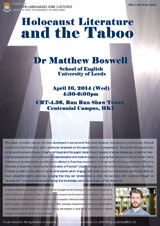
| News & Events |
| 16 April 2014 | |
Seminar: Dr. Matthew Boswell Date: Wednesday April 16, 2014 |
|
Abstract: This paper considers taboos that have developed in and around Holocaust literature, focussing on controversial, fictional responses to the Holocaust, with a particular emphasis on the representation of perpetrators. The writers discussed draw on the psychoanalytic theory of Sigmund Freud and this paper takes Freud’s reading of social taboos as a model for interpreting transgressive forms of historical representation and cultural practice, arguing that the proscription of certain forms of Holocaust representation constitutes an attempt to foreclose responses to the genocide that are particularly difficult to articulate or deal with, including the ‘fascination of Fascism’ (Susan Sontag) and the ordinariness of perpetrator identities. It makes a case for the value of novels and poems which engage with truths about our relationship with history that are never straightforwardly empirical, arguing that they are fundamental to what the Germans term ‘working through’ or ‘dealing with’ (Vergangenheitsbewältigung) the knowledge and cultural legacy of the Holocaust. |
|
